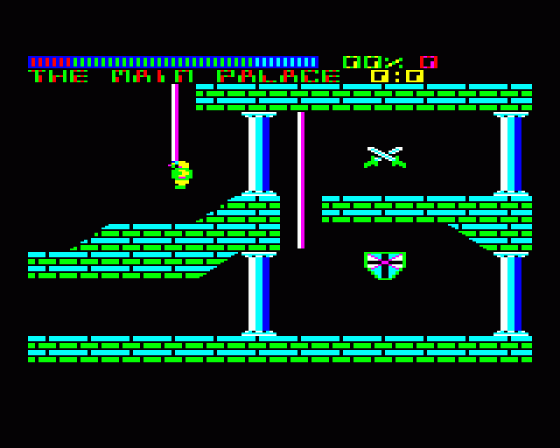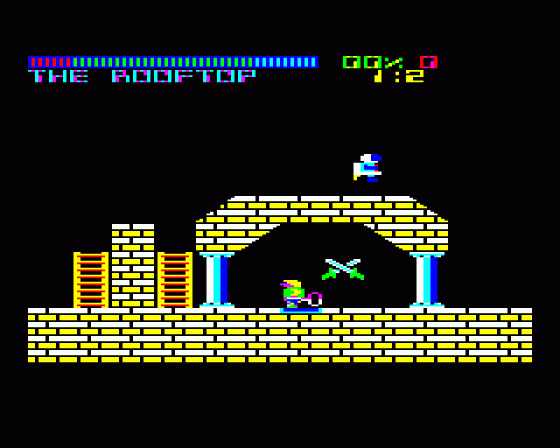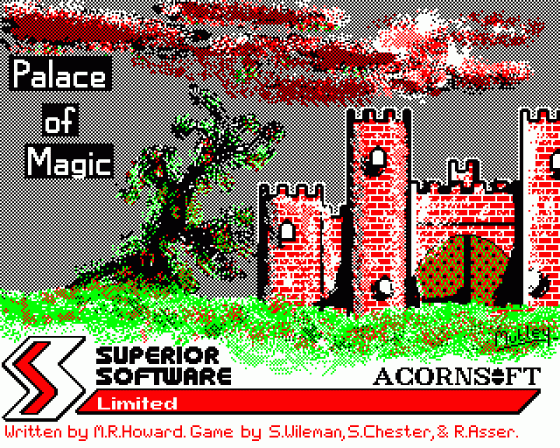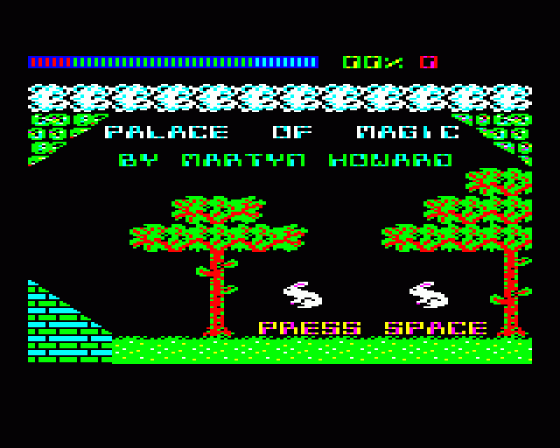
EUG PD
 5th September 2020
5th September 2020
Categories: Review: Software
Author: Dave E
Publisher: Superior/Acornsoft
Machine: Acorn Electron
Published in EUG #75
The Only Thing Worth Buying
Back in the Eighties, when I was about ten years old, a friend of mine called William King (who was also ten) was given a whole £10 for his birthday. We eagerly legged it down to the local independent computer store where we looked for a game for his Acorn Electron. To say that there was rather a dearth of games available was an understatement. On the shelves we found a few battered old Acornsoft games, Oxbridge by Tynesoft (which we dismissed as educational and so not worth buying!) and Palace Of Magic by Superior/Acornsoft. We'd never heard of it but my mate wanted a game and, after some real agonising, he decided to risk buying it.
We charged back home and loaded up the tape. We watched a whole Palace be built up on the screen in Mode 1 (which took about five minutes - we had no idea we could've spun the tape on and just *RUNned the main file!) and when the game proper began, he took the controls, bounced around the first few rooms and tried to work out exactly who to fight and where all the action was. I had a go a few minutes later and was similarly unimpressed.
We Collectively Sighed
Now, don't get me wrong, we appreciated the graphics, the slick control of the main character, the zippy noises made when he jumped or collided with a baddy. We even liked the way he was immediately transported away from danger if his energy was draining too quickly and returned to the point at which he entered the room. But there was sort of a collective disappointment that my friend had spent all of his birthday money on this game. £9.95 in those days was like £40 today, and we wanted something fun - and Palace Of Magic didn't excite us at all. In fact, my mate flogged the game for £2 a few days later.

Fortunately (as it turned out), not before we'd taken a tape-to-tape copy of it - because I went on to play it somewhat obsessively over the next few years. Far from being the bore-fest that it seemed on first purchase, as I progressed further and further into the palace, it just got more and more addictive. In fact, Palace Of Magic is one of the very few graphic adventures on the Electron that I've actually worked out the solution for on my own, by painstakingly working out the quickest route from A to B to C, and which objects are required to be carried in order for time not to be wasted. And so, with all of this rather irrelevant information about my childhood as background, on to the review...
Plotting The Palace
So what's the plot, you ask? Well, the instructions say you have been turned into a dwarf and banished to the palace because you "offended" a wizard called Caldeti. (Caldeti is actually an anagram of Citadel which was a trend-setting graphic adventure on the Electron - and pretty much became associated with it overnight!). Being a dwarf isn't actually too bad though, because you're no smaller than the other inhabitants of the palace. To win the game you have to get to the transporter which is somewhere in the palace, and operate it to restore you to normal height (I'm not quite sure why a transporter would do this but hey ho!) and then teleport you out of your dreaded prison.
The game is done, on the Electron, in Mode 5, with a nice range of colours (which change from room to room) and barely any fluxation, even when the room features a range of patrolling creatures. The creatures are a weird bunch, ranging from the familiar (giant rabbits) to the obscure (heads on spring-like bodies). Contact with them drains your energy, as does touching any of the swords and coats-of-arms that also litter the rooms. Getting around is by achieved by running left or right, and climbing or descending ropes which extend and retract from ceilings. You often need to leap over pits of spikes and grab a rope, jump up it and then leap off it onto a platform before it fully retracts.
Energy Levels

All of the creatures move in set patterns and so one might have thought avoiding them would be relatively easy. However, some of the rooms are plotted in such a way that you cannot avoid coming into contact with them for a short period of time. As you only have a finite amount of energy therefore, the skill of the game is in plotting a route that keeps this contact time to a minimum, and ensures that you can regularly pick up the top hats which restore your energy to maximum. Your energy also depletes from falling too far or from simply milling around for too long, and, even if you know the solution to the game, you will still have to face some sections with a degree of trepidation - because getting it wrong could wipe out those last remaining bars of energy and see all the hard work undone.
Your goal in Palace Of Magic, as mentioned, is to reach the transporter. However, you'll quickly find that your way through the palace is barred both by gates (labelled A, B, C, etc) and by "other things" (a priest, a knight, a guard) and by seemingly impossible jumps or congregations of creatures. The answer to the gates is to collect the corresponding keys. The answer to the other problems involves placing an object on a special tile. In one location teeming with bouncing telephone-looking creatures, dropping a trophy onto a special tile causes them all to completely disappear. In another you can collect a gun and temporarily blast some of the spring-things to clear a path through them. Impossible-to-reach places suddenly become possible when you drop a coiled rope on a special tile and it expands. Or when the priest barring the way disappears when you run into him carrying the crucifix.
Fun Factor
These added touches which are always different are remarkably clever. Keys and gates are pretty boring - and many graphic adventures simply use that formula wholesale, even if they replace the key with a crystal ball and the gate with a witch (or some such). But Palace Of Magic extends this formula not only in some of the ways set out above but also in others. There's a candle which lights up the dark locations, for example (Very "text adventure"ish) and a quite marvellous sequence involving jet-boots.

The huge, sprawling environs of the palace are also not without their charm. The roofs of the palace are a battlement of bouncing spacemen and tortious falls whilst the woods are liberally doused in killer hares. The dungeons have even more different styles of creature.
Fiendish
All of these different elements combine to make one big, fiendishly-designed puzzle. And yet, for some reason, the game doesn't seem in any way daunting. Because originally in my youth I found the game dull I wanted to really consider as deeply as I am able quite why this is the case. What I concluded is as follows:
Palace Of Magic, unlike say Baron or The Golden Figurine, never really feels unfair to the player. It gives you an arena in which the bad guys move in a particular way... so if you put the work in, you can avoid them and you can survive and get further. You're never going to fall into a river and wipe out the entirety of your energy because, if you do fall into a river, the game lets your energy drain a little, but then senses you've made a mistake, picks you up and allows you to try again. Once you've made a mistake once, you actually don't usually make it a second time because you've learned that a particular section is trickier than expected and when you reach it, your guard goes up.

You start up with a full energy level and you know that, no matter how low it falls, as long as you don't let it drain to zero, you can instantly be restored to your former healthy self by finding a top hat. If you've been smart, haven't collided with the baddies and haven't milled about wondering what to do for too long - and if you haven't wasted top hats by collecting them when you didn't need to! - there'll usually be one that's left in your general vicinity. This means you don't give up in exasperation, even if you're down to a single bar of energy. If you know there's a top hat nearby, you struggle to make it - sometimes surprising yourself by reaching it and overcoming seemingly impossible odds in the process.
Also, the game itself is mapped out so that in some locations, you can see other sections of the maze that you cannot reach yet (i.e. you can see a gate and what lies beyond it but you need to find the key and then return to it to make progress). If you can see a gold bar beyond the gate, it gives rise to an insatiable desire to get that key so you can get that gold bar. The solution to the game therefore tends to present itself to you, rather than you really needing to stretch your brain to work out what you need and where you need it.
I haven't disguised that my initial youthful depression at seeing Palace Of Magic has been converted into something fast approaching wild admiration. Perhaps I was simply too young to appreciate it back then, simply because I wanted a Commodore 64 so I could decapitate the dude opposite a la Barbarian or blast and trap ghosts to rack up a million a la Ghostbusters.
Simply Magical
Quite simply, whilst Palace Of Magic might ultimately be a daft quest for a Miracle-Grow transporter, the game itself is about as magical as an 8 bit game gets. Alright, you haven't (at least initially) got a gun. But you've got everything else here. Perhaps, even though we didn't know it back then on William King's birthday, we'd even actually unwittingly picked up the best game in the whole shop.
Other Reviews Of Palace Of Magic For The Acorn Electron
Palace Of Magic (Superior/Acornsoft)
A review by Desmond (Electron User)
Palace Of Magic (Superior/Acornsoft)
A review by Matthew Fifield (A&B Computing)
Palace Of Magic (Superior/Acornsoft)
A review by Matthew Fifield (A&B Computing)
Palace Of Magic (Superior/Acornsoft)
A review by Dave E (Everygamegoing)
Palace Of Magic (Superior/Acornsoft)
Palace Is Magic






















